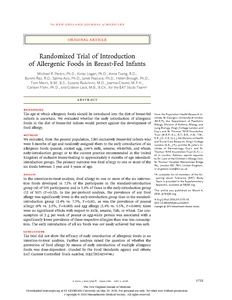Perkin, MR;
Logan, K;
Tseng, A;
Raji, B;
Ayis, S;
Peacock, J;
Brough, H;
Marrs, T;
Radulovic, S;
Craven, J;
et al.
Perkin, MR; Logan, K; Tseng, A; Raji, B; Ayis, S; Peacock, J; Brough, H; Marrs, T; Radulovic, S; Craven, J; Flohr, C; Lack, G; EAT Study Team, EAT
(2016)
Randomized Trial of Introduction of Allergenic Foods in Breast-Fed Infants.
The New England Journal of Medicine, 374 (18).
pp. 1733-1743.
ISSN 0028-4793
https://doi.org/10.1056/NEJMoa1514210
SGUL Authors: Perkin, Michael Richard
![[img]](https://openaccess.sgul.ac.uk/107787/7.hassmallThumbnailVersion/nejmoa1514210.pdf)  Preview |
|
PDF
Published Version
Available under License ["licenses_description_publisher" not defined].
Download (375kB)
| Preview
|
Abstract
BACKGROUND: The age at which allergenic foods should be introduced into the diet of breast-fed infants is uncertain. We evaluated whether the early introduction of allergenic foods in the diet of breast-fed infants would protect against the development of food allergy. METHODS: We recruited, from the general population, 1303 exclusively breast-fed infants who were 3 months of age and randomly assigned them to the early introduction of six allergenic foods (peanut, cooked egg, cow's milk, sesame, whitefish, and wheat; early-introduction group) or to the current practice recommended in the United Kingdom of exclusive breast-feeding to approximately 6 months of age (standard-introduction group). The primary outcome was food allergy to one or more of the six foods between 1 year and 3 years of age. RESULTS: In the intention-to-treat analysis, food allergy to one or more of the six intervention foods developed in 7.1% of the participants in the standard-introduction group (42 of 595 participants) and in 5.6% of those in the early-introduction group (32 of 567) (P=0.32). In the per-protocol analysis, the prevalence of any food allergy was significantly lower in the early-introduction group than in the standard-introduction group (2.4% vs. 7.3%, P=0.01), as was the prevalence of peanut allergy (0% vs. 2.5%, P=0.003) and egg allergy (1.4% vs. 5.5%, P=0.009); there were no significant effects with respect to milk, sesame, fish, or wheat. The consumption of 2 g per week of peanut or egg-white protein was associated with a significantly lower prevalence of these respective allergies than was less consumption. The early introduction of all six foods was not easily achieved but was safe. CONCLUSIONS: The trial did not show the efficacy of early introduction of allergenic foods in an intention-to-treat analysis. Further analysis raised the question of whether the prevention of food allergy by means of early introduction of multiple allergenic foods was dose-dependent. (Funded by the Food Standards Agency and others; EAT Current Controlled Trials number, ISRCTN14254740.).
| Item Type: |
Article
|
| Additional Information: |
From The New England Journal of Medicine, Michael R. Perkin, Ph.D., Kirsty Logan, Ph.D., Anna Tseng, R.D., Bunmi Raji, R.D., Salma Ayis, Ph.D., Janet Peacock, Ph.D., Helen Brough, Ph.D., Tom Marrs, B.M., B.S., Suzana Radulovic, M.D., Joanna Craven, M.P.H., Carsten Flohr, Ph.D., and Gideon Lack, M.B., B.Ch., for the EAT Study Team, Randomized Trial of Introduction of Allergenic Foods in Breast-Fed Infants, Volume No.374, Page No.1733-1743 Copyright © 2016. Massachusetts Medical Society. Reprinted with permission. |
| Keywords: |
EAT Study Team, General & Internal Medicine, 11 Medical And Health Sciences |
| SGUL Research Institute / Research Centre: |
Academic Structure > Population Health Research Institute (INPH) |
| Journal or Publication Title: |
The New England Journal of Medicine |
| ISSN: |
0028-4793 |
| Language: |
eng |
| Dates: |
| Date | Event |
|---|
| 5 May 2016 | Published |
|
| Publisher License: |
Publisher's own licence |
| Projects: |
|
| PubMed ID: |
26943128 |
 |
Go to PubMed abstract |
| URI: |
https://openaccess.sgul.ac.uk/id/eprint/107787 |
| Publisher's version: |
https://doi.org/10.1056/NEJMoa1514210 |
Statistics
Item downloaded times since 01 Jun 2016.
Actions (login required)
 |
Edit Item |



